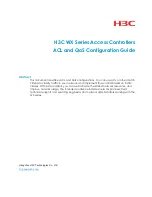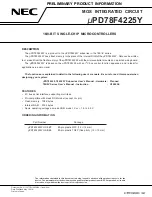
CY8C28xxx PSoC Programmable System-on-Chip TRM, Document No. 001-52594 Rev. *G
499
I
2
C
Bits 3 and 2: Clock Rate[1:0].
These bits offer a selection
of three sampling and bit rates. All block clocking is based
on the SYSCLK input, which is nominally 24 MHz (unless
the PSoC device is in external clocking mode). The sam-
pling rate and the baud rate are determined as follows:
■
Sample Rate = SYSCLK/Pre-scale Factor
■
Baud Rate = 1/(Sample Rate x Samples per Bit)
The nominal values, when using the internal 24 MHz oscilla-
tor, are shown in
When clocking the input with a frequency other than 24 MHz
(for example, clocking the PSOC device with an external
clock), the baud rates and sampling rates will scale accord-
ingly. Whether the block will work in a Standard Mode or
Fast Mode system depends on the sample rate. The sample
rate must be sufficient to resolve bus events, such as Start
and Stop conditions. (See the
2
C-bus™ Specification
and User Manual, version 03
, for minimum Start and Stop
hold times.)
Bit 1: Enable Master.
When this bit is set, the Master Sta-
tus and Control register is enabled (otherwise it is held in
reset) and I
2
C transfers can be initiated in Master mode.
When the master is enabled and operating, the block will
clock the I
2
C bus at one of three baud rates, defined in the
Clock Rate register. When operating in Master mode, the
hardware is multi-master capable, implementing both clock
synchronization and arbitration. If the Slave Enable bit is not
set, the block will operate in Master Only mode. All external
Start conditions are ignored (although the Bus Busy status
bit will still keep track of bus activity). Block enable will be
synchronized to the SYSCLK clock input (
).
Bit 0: Enable Slave.
When the slave is enabled, the block
generates an interrupt on any Start condition and an
address byte that it receives, indicating the beginning of an
I
2
C transfer. When operating as a slave, the block is clocked
from an external master. Therefore, the block will work at
any frequency up to the maximum defined by the currently
selected clock rate. The internal clock is only used in Slave
mode, to ensure that there is adequate setup time from data
output to the next clock on the release of a slave stall. When
the Enable Slave and Enable Master bits are both ‘0’, the
block is held in reset and all status is cleared. See
for a description of the interaction between the
Master/Slave Enable bits. Block enable will be synchronized
to the SYSCLK clock input (
For additional information, refer to the
Table 28-3. I
2
C Clock Rates
Clo
c
k Ra
te
[1:0
]
I
2
C Mod
e
S
YSCLK
Pr
e-s
cal
e
Fact
o
r
Sam
p
le
s
pe
r Bi
t
Int
e
rna
l
Sa
m
p
li
ng
Fr
eq
./P
e
rio
d
(24 MHz)
Maste
r
Baud Ra
te
(nom
inal)
St
a
rt
/S
to
p
Ho
ld
T
ime
(8 cl
o
c
ks)
00b
Standard
/16
16
1.5 MHz/667 ns
93.75 kHz
5.3
s
01b
Fast
/4
16
6 MHz/167 ns
375 kHz
1.33
s
10b
Standard
/16
32
1.5 MHz/667 ns
46.8 kHz
10.7
s
11b
Reserved
Table 28-4. Enable Master/Slave Block Operation
Enable
Master
Enable
Slave
Block Operation
No
No
Disabled:
The block is disconnected from the GPIO pins, P1[5]
and P1[7]. (The pins may be used as general purpose
I/O.) When either the master or slave is enabled, the
GPIO pins are under control of the I
2
C hardware and
are unavailable.
All internal registers (except I2C_CFG) are held in
reset.
No
Yes
Slave Only Mode:
Any external Start condition will cause the block to
start receiving an address byte. Regardless of the cur-
rent state, any Start resets the interface and initiates a
Receive operation. Any Stop will cause the block to
revert to an idle state
The I2C_MSCR register is held in reset.
Yes
No
Master Only Mode:
External Start conditions are ignored in this mode. No
Byte Complete interrupts on external traffic are gener-
ated, but the Bus Busy status bit continues to capture
Start and Stop status, and thus may be polled by the
master to determine if the bus is available.
Full multi-master capability is enabled, including clock
synchronization and arbitration.
The block will generate a clock based on the setting in
the Clock Rate register
Yes
Yes
Master/Slave Mode:
Both master and slave may be operational in this
mode. The block may be addressed as a slave, but
firmware may also initiate Master mode transfers.
In this configuration, when a master loses arbitration
during an address byte, the hardware will revert to
Slave mode and the received byte will generate a
slave address interrupt.
Summary of Contents for CY8C28 series
Page 65: ...64 CY8C28xxx PSoC Programmable System on Chip TRM Document No 001 52594 Rev G RAM Paging ...
Page 125: ...124 CY8C28xxx PSoC Programmable System on Chip TRM Document No 001 52594 Rev G ...
Page 311: ...310 CY8C28xxx PSoC Programmable System on Chip TRM Document No 001 52594 Rev G IDAC_CR0 1 FDh ...
Page 317: ...316 CY8C28xxx PSoC Programmable System on Chip TRM Document No 001 52594 Rev G ...
Page 393: ...392 CY8C28xxx PSoC Programmable System on Chip TRM Document No 001 52594 Rev G ...
Page 477: ...476 CY8C28xxx PSoC Programmable System on Chip TRM Document No 001 52594 Rev G Digital Clocks ...
Page 561: ...560 CY8C28xxx PSoC Programmable System on Chip TRM Document No 001 52594 Rev G ...
















































